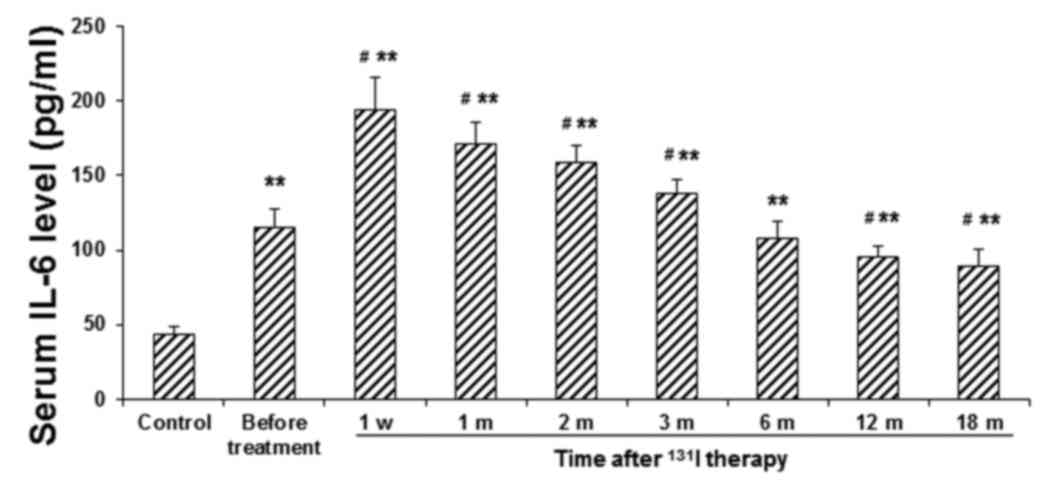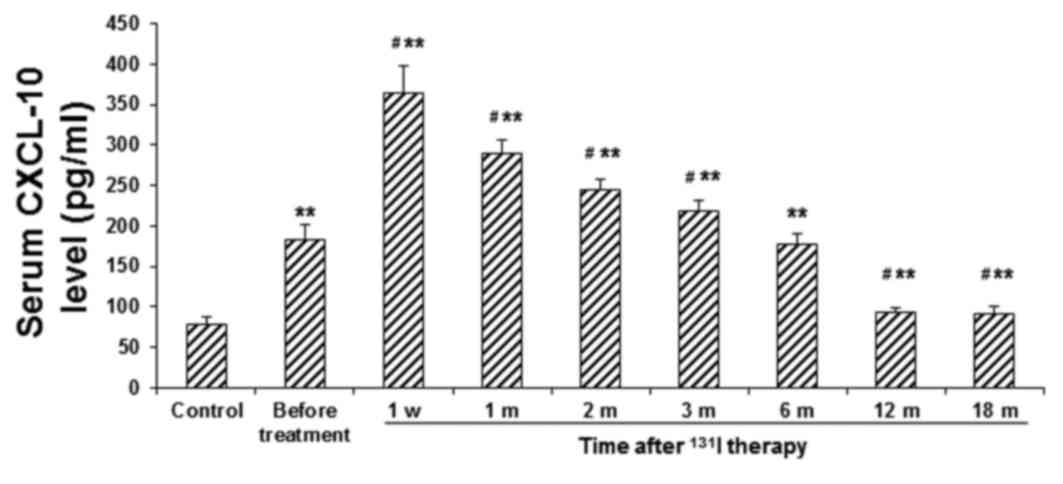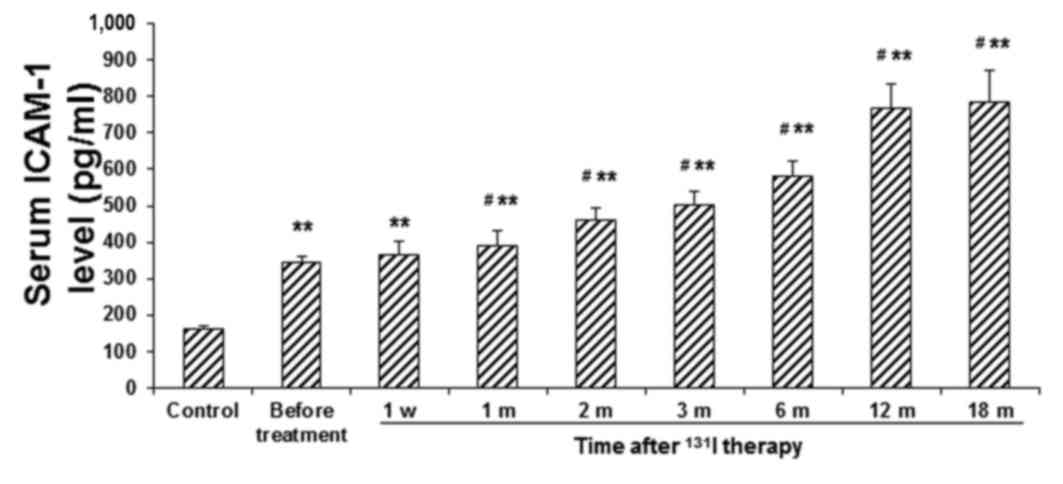|
1
|
Prummel MF, Strieder T and Wiersinga WM:
The environment and autoimmune thyroid diseases. Eur J Endocrinol.
150:605–618. 2004. View Article : Google Scholar : PubMed/NCBI
|
|
2
|
Saitoh O, Abiru N, Nakahara M and Nagayama
Y: CD8+CD122+ T cells, a newly identified
regulatory T subset, negatively regulate Graves' hyperthyroidism in
a murine model. Endocrinology. 148:6040–6046. 2007. View Article : Google Scholar : PubMed/NCBI
|
|
3
|
Hammerstad SS, Jahnsen FL, Tauriainen S,
Hyöty H, Paulsen T, Norheim I and Dahl-Jørgensen K: Immunological
changes and increased expression of myxovirus resistance protein a
in thyroid tissue of patients with recent onset and untreated
Graves' disease. Thyroid. 24:537–544. 2014. View Article : Google Scholar : PubMed/NCBI
|
|
4
|
Kawashima A, Tanigawa K, Akama T,
Yoshihara A, Ishii N and Suzuki K: Innate immune activation and
thyroid autoimmunity. J Clin Endocrinol Metab. 96:3661–3671. 2011.
View Article : Google Scholar : PubMed/NCBI
|
|
5
|
Kidd P: Th1/Th2 balance: The hypothesis,
its limitations and implications for health and disease. Altern Med
Rev. 8:223–246. 2003.PubMed/NCBI
|
|
6
|
Rapoport B and McLachlan SM: Graves'
hyperthyroidism is antibody-mediated but is predominantly a
Th1-type cytokine disease. J Clin Endocrinol Metab. 99:4060–4061.
2014. View Article : Google Scholar : PubMed/NCBI
|
|
7
|
Morshed SA, Latif R and Davies TF:
Delineating the autoimmune mechanisms in Graves' disease. Immunol
Res. 54:191–203. 2012. View Article : Google Scholar : PubMed/NCBI
|
|
8
|
Chair RS Bahn, Burch HB, Cooper DS, Garber
JR, Greenlee MC, Klein I, Laurberg P, McDougall IR, Montori VM,
Rivkees SA, et al: Hyperthyroidism and other causes of
thyrotoxicosis: Management guidelines of the American Thyroid
Association and American Association of Clinical Endocrinologists.
Thyroid. 21:593–646. 2011. View Article : Google Scholar : PubMed/NCBI
|
|
9
|
Ahmad AM, Ahmad M and Young ET: Objective
estimates of the probability of developing hypothyroidism following
radioactive iodine treatment of thyrotoxicosis. Eur J Endocrinol.
146:767–775. 2002. View Article : Google Scholar : PubMed/NCBI
|
|
10
|
Chiovato L, Fiore E, Vitti P, Rocchi R,
Rago T, Dokic D, Latrofa F, Mammoli C, Lippi F, Ceccarelli C and
Pinchera A: Outcome of thyroid function in Graves' patients treated
with radioiodine: Role of thyroid-stimulating and
thyrotropin-blocking antibodies and of radioiodine-induced thyroid
damage. J Clin Endocrinol Metab. 83:40–46. 1998. View Article : Google Scholar : PubMed/NCBI
|
|
11
|
Andrade VA, Gross JL and Maia AL: The
effect of methimazole pretreatment on the efficacy of radioactive
iodine therapy in Graves' hyperthyroidism: One-year follow-up of a
prospective, randomized study. J Clin Endocrinol Metab.
86:3488–3493. 2001. View Article : Google Scholar : PubMed/NCBI
|
|
12
|
Gómez-Arnaiz N, Andía E, Gumà A, Abós R,
Soler J and Gómez JM: Ultrasonographic thyroid volume as a reliable
prognostic index of radioiodine-131 treatment outcome in Graves'
disease hyperthyroidism. Horm Metab Res. 35:492–497. 2003.
View Article : Google Scholar : PubMed/NCBI
|
|
13
|
Mikos H, Mikos M, Obara-Moszynska M and
Niedziela M: The role of the immune system and cytokines involved
in the pathogenesis of autoimmune thyroid disease (AITD).
Endokrynologia Polska. 65:150–155. 2014.PubMed/NCBI
|
|
14
|
Khan FA, Al-Jameil N, Khan MF, Al-Rashid M
and Tabassum H: Thyroid dysfunction: An autoimmune aspect. Int J
Clin Exp Med. 8:6677–6681. 2015.PubMed/NCBI
|
|
15
|
Dong QY, Li SJ, Gao GQ, Liu XM, Li WX,
Liang CG, Du WH and Wsng YL: Short-term effect of radioactive
iodine therapy on CXCL-10 production in Graves' disease. Clin
Invest Med. 34:E2622011.PubMed/NCBI
|
|
16
|
Jurgilewicz DH, Rogowski F, Łebkowska U,
Citko A, Jaroszewicz E and Parfieńczyk A: E-selectin, L-selectin,
ICAM-1 and IL-6 concentrations changes in the serum of patients
with hyperthyroidism in the early period of radioiodine I-131
therapy. Nucl Med Rev Cent East Eur. 5:39–42. 2002.PubMed/NCBI
|
|
17
|
Chinese Society of Endocrinology, .
Medical guidelines for the management of Thyroid disease in China.
Clin J Intern Med. 46(10)2007.
|
|
18
|
Zeki K, Tanaka Y, Fujihira T, Watanabe K,
Suzuki H, Yamashita U and Eto S: Immunological abnormality of
peripheral blood B cells in patients with autoimmune thyroid
disease. Endocrinol Jpn. 36:335–342. 1989. View Article : Google Scholar : PubMed/NCBI
|
|
19
|
Mysliwiec J, Palyga I, Nikolajuk A,
Kowalska A and Gorska M: Serum interleukin-16 and RANTES during
treatment of Graves' orbitopathy with corticosteroids and
teleradiotherapy. Endokrynol Pol. 63:92–96. 2012.PubMed/NCBI
|
|
20
|
Niyazoglu M, Baykara O, Koc A, Aydoğdu P,
Onaran I, Dellal FD, Tasan E and Sultuybek GK: Association of
PARP-1, NF-κB, NF-κBIA and IL-6, IL-1β and TNF-α with Graves
Disease and Graves Ophthalmopathy. Gene. 547:226–232. 2014.
View Article : Google Scholar : PubMed/NCBI
|
|
21
|
Wahrenberg H, Wennlund A and Hoffstedt J:
Increased adipose tissue secretion of interleukin-6, but not of
leptin, plasminogen activator inhibitor-1 or tumour necrosis factor
alpha, in Graves' hyperthyroidism. Eur J Endocrinol. 146:607–611.
2002. View Article : Google Scholar : PubMed/NCBI
|
|
22
|
Antonelli A, Rotondi M, Fallahi P,
Romagnani P, Ferrari SM, Buonamano A, Ferrannini E and Serio M:
High levels of circulating CXCL chemokine ligand 10 are associated
with chronic autoimmune thyroiditis and hypothyroidism. J Clin
Endocrinol Metab. 89:5496–5499. 2004. View Article : Google Scholar : PubMed/NCBI
|
|
23
|
Arao T, Morimoto I, Kakinuma A, Ishida O,
Zeki K, Tanaka Y, Ishikawa N, Ito K, Ito K and Eto S: Thyrocyte
proliferation by cellular adhesion to infiltrating lymphocytes
through the intercellular adhesion molecule-1/lymphocyte
function-associated antigen-1 pathway in Graves' disease. J Clin
Endocrinol Metab. 85:382–389. 2000. View Article : Google Scholar : PubMed/NCBI
|
|
24
|
Hunter CA and Jones SA: IL-6 as a keystone
cytokine in health and disease. Nat Immunol. 16:448–457. 2015.
View Article : Google Scholar : PubMed/NCBI
|
|
25
|
Salvi M, Girasole G, Pedrazzoni M, Passeri
M, Giuliani N, Minelli R, Braverman LE and Roti E: Increased serum
concentrations of interleukin-6 (IL-6) and soluble IL-6 receptor in
patients with Graves' disease. J Clin Endocrinol Metab.
81:2976–2979. 1996. View Article : Google Scholar : PubMed/NCBI
|
|
26
|
Heuer M, Aust G, Ode-Hakim S and Scherbaum
WA: Different cytokine mRNA profiles in Graves' disease,
Hashimoto's thyroiditis and nonautoimmune thyroid disorders
determined by quantitative reverse transcriptase polymerase chain
reaction (RT-PCR). Thyroid. 6:97–106. 1996. View Article : Google Scholar : PubMed/NCBI
|
|
27
|
Antonelli A, Rotondi M, Ferrari SM,
Fallahi P, Romagnani P, Franceschini SS, Serio M and Ferrannini E:
Interferon-gamma-inducible alpha-chemokine CXCL10 involvement in
Graves' ophthalmopathy: Modulation by peroxisome
proliferator-activated receptor-gamma agonists. J Clin Endocrinol
Metab. 91:614–620. 2006. View Article : Google Scholar : PubMed/NCBI
|
|
28
|
Antonelli A, Ferrari SM, Corrado A, Di
Domenicantonio A and Fallahi P: Autoimmune thyroid disorders.
Autoimmun Rev. 14:174–180. 2015. View Article : Google Scholar : PubMed/NCBI
|
|
29
|
Makgoba MW, Sanders ME, Luce GE Ginther,
Dustin ML, Springer TA, Clark EA, Mannoni P and Shaw S: ICAM-1 a
ligand for LFA-1-dependent adhesion of B, T and myeloid cells.
Nature. 331:86–88. 1988. View
Article : Google Scholar : PubMed/NCBI
|
|
30
|
Wenisch C, Myskiw D, Parschalk B, Hartmann
T, Dam K and Graninger W: Soluble endothelium-associated adhesion
molecules in patients with Graves' disease. Clin Exp Immunol.
98:240–244. 1994. View Article : Google Scholar : PubMed/NCBI
|
|
31
|
Crescioli C, Cosmi L, Borgogni E,
Santarlasci V, Gelmini S, Sottili M, Sarchielli E, Mazzinghi B,
Francalanci M, Pezzatini A, et al: Methimazole inhibits CXC
chemokine ligand 10 secretion in human thyrocytes. J Endocrinol.
195:145–155. 2007. View Article : Google Scholar : PubMed/NCBI
|

















